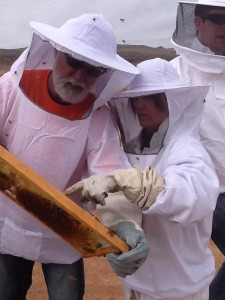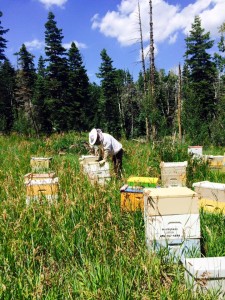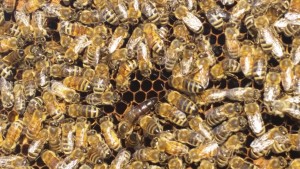
ST. GEORGE – Two separate bills that would have affected beekeepers if passed during the general session did not make it out of House committees but one of the bills is expected to find consideration during interim study during the summer. The issues represent a continuing debate among beekeepers and lawmakers about how much regulation is needed to maintain the health of both the bee population and the beekeeping industry.
Honey bees are under serious pressure in recent years from a variety of sources including colony collapse disorder and new pathogens including mites, fungi and hive beetles, the U.S. Department of Agriculture states.
“The bees have become a great asset because without them very few things grow,” Rep. Kay McIff, sponsor of one of the bills, said. “So we need them and we need the industry to be healthy and we want to guard against changes that would render it defective or unworkable.”
The bills that failed to pass
Bee Keeping Amendments, H.B. 315, was sponsored by Kay McIff and would have made major changes to the Utah Bee Inspection Act by imposing mandatory registration on all beekeepers and introducing a new 2-mile exclusionary zone for commercial bee yards, or apiaries. The bill also sought to add penalties of up to $1,000 per day for violations. The bill received a 12-0 favorable recommendation, with two not voting, from the House Natural Resources, Agriculture, and Environment Committee but never made it through the House Rules Committee. On the recommendation of the Utah Department of Agriculture and Food, McKiff said, the bill will go to interim study to be looked at and discussed over the summer.
Beekeeping Modifications bill, H.B. 115, introduced by Rep. Marc Roberts, R-Sanaquin, would have removed the requirement for beekeepers to register with the state. It sought to bar political subdivisions such as cities from prohibiting a property owner from establishing or maintaining an apiary. The bill as introduced failed to receive
The bill as introduced failed to receive favorable recommendation from the House Natural Resources, Agriculture, and Environment Committee. A proposed substitute bill was drafted proposing to change registration from voluntary to mandatory for a person who owns more than five beehives and add an effective date of July 1, 2016, to a section barring political subdivisions from passing ordinances that would prevent property owners from keeping bees. The bill was returned to the House Rules Committee where it died.
Read more: Utah Legislature considers bill removing some regulations for beekeepers

The issues
“It’s kind of a mess,” local beekeeper and Washington County bee inspector Casey Lofthouse said. “You’ve got one guy thinking that we need to just modify the rules we have – basic, simple, easy common-sense adjustments. Then you have other people that want to attach a bunch of bureaucratic red tape to the beekeeping industry.”
The Beekeeping Amendments bill was a protectionism bill for existing large beekeepers, Lofthouse said, that would have created monopolies and stifle any prospective competition from newcomers to the industry.
“You have a minimal number of larger commercial beekeepers that are pushing for registered (bee) yards, and asking for a 2-mile exclusionary zone around each of those registered yards,” Lofthouse said.
The bill sought to classify commercial beekeepers as those having 150 or more hives while “sideliners” operate 20-150 hives and hobbyists have less than 20.
Lofthouse has close to 350 hives, and under the terms of the bill would be considered a commercial operator. However, he opposed the bill.
“I understand the reasoning behind it and the way that it could help,” Lofthouse said, “but I have a basic understanding of freedom and private property rights and, in my opinion, it violates my definition of freedoms and the use of your own property and the ability of a smaller operation to be competitive and not be regulated by the government on how competitive they can be.”

McKiff, however, said the provisions of the bill were needed to protect the industry, and the 2-mile exclusionary zone would protect against excessive concentration of beehives.
While there have not been any problems yet, McKiff is concerned about commercial beekeepers from eastern states who travel to California to pollinate crops.
“You have a mass migration of bee colonies to the California pollination effort,” he said. “Montana and Wyoming have been through this process and adopted some limitations so that we don’t get bees coming out of the east and then not wanting to travel back east but just find a landing spot until the next pollination need because that could be very damaging to our bee industry.”
California’s fruit and nut production requires mass pollination which brings beekeepers from across the country to earn money by renting out their hives on a temporary basis.
Many commercial beekeepers make more money from pollination than from honey production, and by one estimate, 50 percent of the bees in the United States have to be in California to pollinate the almond crop.
In between pollination events in California, commercial beekeepers may be looking for a relatively close location to park their hives, and Utah may be a target.
There is a limited amount of forage available to bees in Utah, McKiff said, and so large numbers of colonies brought in from out of state could harm local hives and beekeepers by consuming all of an area’s pollen and nectar, McKiff said.
The bill’s exclusionary zone would prevent commercial beekeepers from locating near an existing apiary to avoid undermining established operations.
“We’d just like to get ahead of the curve,” McIff said. “Right now we have no regulation at all.”
The issue could impact Washington County first, he said. For commercial beekeepers heading east from Southern California, the St. George area is the first location capable of supporting bees, McIff said, and there is nothing stopping an out-of-state beekeeper from unloading a flatbed full of beehives in Southern Utah.
“They could disrupt whatever bee operations there are in that area, it could disrupt them substantially and just do it overnight, and we wouldn’t have any ability to respond to that as a state,” McIff said.
McIff doesn’t believe his bill would have had a detrimental effect on small beekeeping operations trying to grow larger, and said mandatory registration is needed to help state officials track disease and prevent inappropriate pesticide application, he said.
“It’s to allow the department of agriculture to monitor what we have, inventory it, figure out what we’ve got prepare a map that’s showing the locations,” McIff said while the bill was yet pending before the House committee. “This would allow officials to deal with disease quickly and effectively, and publish the location of hives and apiaries so pesticide applicators or deal with pesticide sprayers who may venture out without knowing and would cause problems of that nature.”

Email: [email protected]
Twitter: @STGnews
Copyright St. George News, SaintGeorgeUtah.com LLC, 2016, all rights reserved.
More government intrusion all in the name of S-A-F-E-T-Y.
Leave private property alone. Leave the American people alone. Go screw up something else, somewhere else.